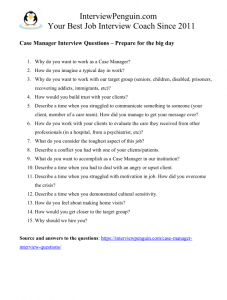If you like helping people in need, see a meaningful purpose in social work, and have some courage, and planning and organizational skills, and excel in communication, Case Manager will be a great job for you. In this article we will look at some questions you may face in your interview, and how you should answer each one of them.
Keep in mind that your non-verbal communication is as important as your interview answers. This job is not easy, and unless the interviewers see your honest motivation and enthusiasm for the work, they will not hire you. Let’s have a look at the questions!
Table of Contents
Why do you want to work as a Case Manager?
You can say that you believe to have the skills that are essential for an excellent case manager (empathy, communication skills, ability to solve conflicts, planning and organizational skills), and see a meaningful purpose in this type of work.
Alternatively you can narrate a story (can be your personal story) of a difficult situation someone experienced, and a vital role a Case Manager played in helping them overcome the situation, and how this experience motivated you to purse the same career path. You can also refer to your previous working experience or education (if relevant).
Sample answer:
I honestly think that I have the skills, motivation, and attitude to become an excellent case manager. What’s more, I really like the job description, and find a personal satisfaction in this type of work—direct contact, helping people, seeing the impact I have on their life. I think that we should never work only for money. I see a meaningful purpose in this work, and believe to have everything to excel in it. That’s why I consider it a perfect choice, at least at this stage of my professional career.
How do you imagine a typical day at work?
Case managers work in all kinds of institutions, and obviously your day in a community hospital will differ from your day in a youth detention center, or in a rehab. In all cases, however, you should show proactive approach to work. Say that you will actively seek opportunities to help your clients, that you will make regular contact with them, and won’t just wait until someone knocks on your door.
You can say that you will devote most of your time to meetings (and suggest that you do not mind making home visits), or phone calls, while trying to arrange things for your clients. You can also say that you plan to devote a part of each day to administrative work (which belongs to this profession, and we cannot avoid it).
Sample answer:
I imagine working with patients who suffer from a physical or mental issue which requires long term treatment. Visiting them either directly in the hospital, or at their homes, I will try to help them find the most effective and affordable way of treating their illness, and to live a quality life—at least to an extend that their medical condition allows.
In order to do that, first and foremost I must understand them—their daily life, their concerns, needs, financial situation, dreams, and fears. Then I imagine serving as a liaison between them, and community agencies that offer assistance, such as crisis centers, legal advocates, counselors and other bodies, even the insurance company. Meetings, phone calls, emails, and administrative work that belongs to this process will likely from my daily bread in work.
Why do you want to work with our target group (seniors, children, disabled, prisoners, recovering addicts, immigrants, people in hospital, etc)?
Here you have a few options. One is saying that you feel close to that particular group of people (either you had a case in your own family, or you simply feel for them), and believe that you have what it takes to work with them, and help them overcome their problems. You can also refer to your experience with the particular target group, which can be from both personal and professional life, and explain how it prepared you to work with this group.
In a case that you have no experience, or can’t narrate any relevant situation from the past, you can simply say that you like the job description, that you did some research about the particular group of people, and believe you can do the job.
Sample answer:
I have always felt close to old people. Sometimes it seems that they are invisible for the society, and they can definitely feel extremely lonely. I know that elderly people form the majority of your clients. They do not have the skills the young generation has with the internet, they cannot easily find relevant information about their treatment, insurance, options they have in their condition, benefits they are eligible for. I honestly believe that the role of a case manager is especially important in this case, and that’s why I decided for your place.
How would you build trust with your clients?
Building trust is one of the toughest, and most important tasks of a Case Manager. In my experience, humility, honest interest in their problems and needs, friendly attitude and willingness to step out of your office and make home visits help with trust building. You can also say that you plan to advocate for your clients, and that once they see that you really try to help them (and not merely do the job as a formality), they will trust you.
In reality, it is not possible to win trust of each and every client. You will build great relationship with some, and fail to build any relationship with others. This is a part of the job, and you should count with it. It is your attitude that matters the most in an interview–and you should show the right attitude. Whether you will succeed or not in your practice is another thing…
Sample answer:
I’d be very transparent with them in everything. If I did like something about their behavior (or didn’t like), I’d tell them—of course with the right words.
I want them to see that I really care, that I consider each case individually, that I do not blindly categorize them, or follow the same procedure with everyone, suggesting the same things and options. And I believe that action beats words. When they see that I really try to help them with my work, they will trust me (at least most of them will).
Special Tip: To know how to answer a question, and to come up with a unique and amazing answer on a big day, when facing your interviewers, are two different things. If you experience anxiety, do not know what exactly to say in the interviews, or simply want to streamline your interview preparation and ensure you won’t fail, have a look at a new eBook I wrote for you, the Case Manager Interview Guide. Multiple great answers to 25 most common questions you can face in this interview will help you to make the best possible impression on the interviewers, and walk away with a new employment agreement. Check the samples on the eBook page and see for yourself…
Describe a time when you struggled to communicate something to someone (your client, member of a care team). How did you manage to get your message over?
They will try to assess your communication skills in the entire interview, watching your language, listening skills, whether you talk to the point, etc. In this case, however, you should show that you do not mind stepping out of your comfort zone and changing your language, to ensure that the client understood you. Describe a situation from the past, when you used presentation, demonstration, or other way of explaining your message to someone who did not understand your initial words.
You can also say that you are very patient when it comes to communication, and do not mind repeating the same information several times, until you are sure that they understood the meaning of your message correctly.
Sample answer:
This is my first job application, so I have never experienced similar situation. But I understand it is crucial to get my message over. Patients have to understand my words, or at least my non-verbal communication. If they do not, we cannot progress with any counseling.
I plan to use comparisons, practical examples, and especially demonstration to ensure that they will understand my words. What’s more, I will always adjust my message to the intelligence and diagnosis of the person I talk to. That’s probably the most I can do to get my message over, and I expect it to be difficult at times. But I am patient, and I will continue trying until I succeed.
How do you work with your clients to evaluate the care they received from other professionals (in a hospital, from a psychiatrist, etc)?
You can emphasize the crucial role of feedback in your work. Say that you will always ask both the client and the care provider, to get a complex idea of the situation.
You can also say that you plan to set goals with each client, and results they try to achieve with other medical/social work professionals, and will evaluate the progress their made in achieving these goals, after each period of care they received from other professionals.
Sample answer:
I prefer to have a regular contact with both the client and the healthcare professionals they receive treatment from. I think it is important to hear the opinion of both parties, because the client can perceive some situation or treatment in a different way than the HC professional. If I find such a discrepancy, I should address it immediately.
In my opinion, this work is mostly about asking right questions, and listening carefully. If I am patient enough and have an in-depth knowledge of a treatment my client receives (and the provider), it won’t be difficult to evaluate the quality of treatment, and to propose any changes, or intervene when necessary.
What do you consider the toughest aspect of this job?
You should see the job realistically–unless you want to experience a burnout, and quit after few months. Work of a case manager is often stressful and difficult. The clients may not cooperate, you may not achieve any results with them, and some people may even blame you (as a a part of the government apparatus) for their personal problems or health issues.
The best Case Managers are not results driven. They focus on their efforts. They try their very best in work, day in day out, but they do not care much about the final outcome–because they realize that the final outcome, and what will eventually happen withe the particular client, is beyond their control.
You can say that experiencing disappointment is tough, or rejection, or that it is tough to forget the problems of your job in your personal life. But ensure the interviewers that you count with all of that, and are ready for both the good and the bad things which this job will bring to your life.
Sample answer:
I think that keeping distance, and not getting affected emotionally is the most difficult aspect of the job—at least for me. I honestly care for people and for their well-being. To talk daily with people who experience all kinds of miseries, and who fight with their demons each day, is not easy for a sensitive person. However, this belongs to our job, and we have to learn how to deal with that. I am sure that my colleagues will help, and that I will get used to this after spending more time in your place. At the end of the day, we can help them see the light at the end of the tunnel, or even become the light…
Describe a conflict you had with one of your clients/patients.
The attitude you present in your answer is more important than the conflict situation which you will narrate. Regardless of the situation you will describe, try to put emphasis on the fact that you tried your best to see the perspective of the client, to see the situation through their eyes.
You should speak about the conflict in a calm voice. Conflict situations belong to this job, but the key is to not let them ruin your relationship with the client. Good case manager can admit making a mistake, and they do not mind letting the client “win” the agreement. They do all of this while trying to achieve the goals they set with the client. They always see the bigger picture…
Sample answer:
I remember a conflict with a client I tried to help get a job, after being unemployed for a long time. They disagreed with my choice of jobs, the opportunities I presented to them. They wanted to do something else, they didn’t like the idea at all. But their expectations had nothing to do with reality. I tried to explain it to them in a calm voice, not getting involved in the conflict they started. But I also realized that I should have been more sensitive to their feelings and expectations… Eventually we came to some consensus and that was the end of the conflict. I definitely learned my lesson, and the conflict actually helped me to get better in my work.
Other questions they may ask you in your case manager interview
- What do you want to accomplish as a Case Manager in our institution?
- What does integrity mean to you?
- Describe a time when you struggled with motivation in job. How did you overcome the crisis?
- What do you consider your biggest weakness when we talk about case management?
- How do you feel about making home visits?
- Describe a time when you demonstrated leadership in work.
- How would you describe your communication skills?
- …………….
Final thoughts, great answers to all questions
You won’t compete with many people for a Case Manager job–typically two or three other candidates. But you still have to convince the hiring managers of your readiness for the job, right attitude to work, and that you deserve the job more than the other candidates.
If you are not sure how to do it, have a look at a eBook I wrote for you, the Case Manager Interview Guide (updated in February 2024). Multiple great answers to 25 questions you may realistically get in your interview will help you a lot on a big day. You will find some great sample answers directly on the eBook page, so it makes sense to check it out even if you do not plan to purchase anything.
Thank you, and I wish you good luck in your case manager job interview!
Matthew Chulaw, Your personal job interview coach
* Alternatively you can also download the list of questions in a one page long PDF, and practice your interview answers anytime later, even when offline:

May also interest you:
- CPS interview questions.
- Social work interview questions.
- Intervention specialist interview questions.



